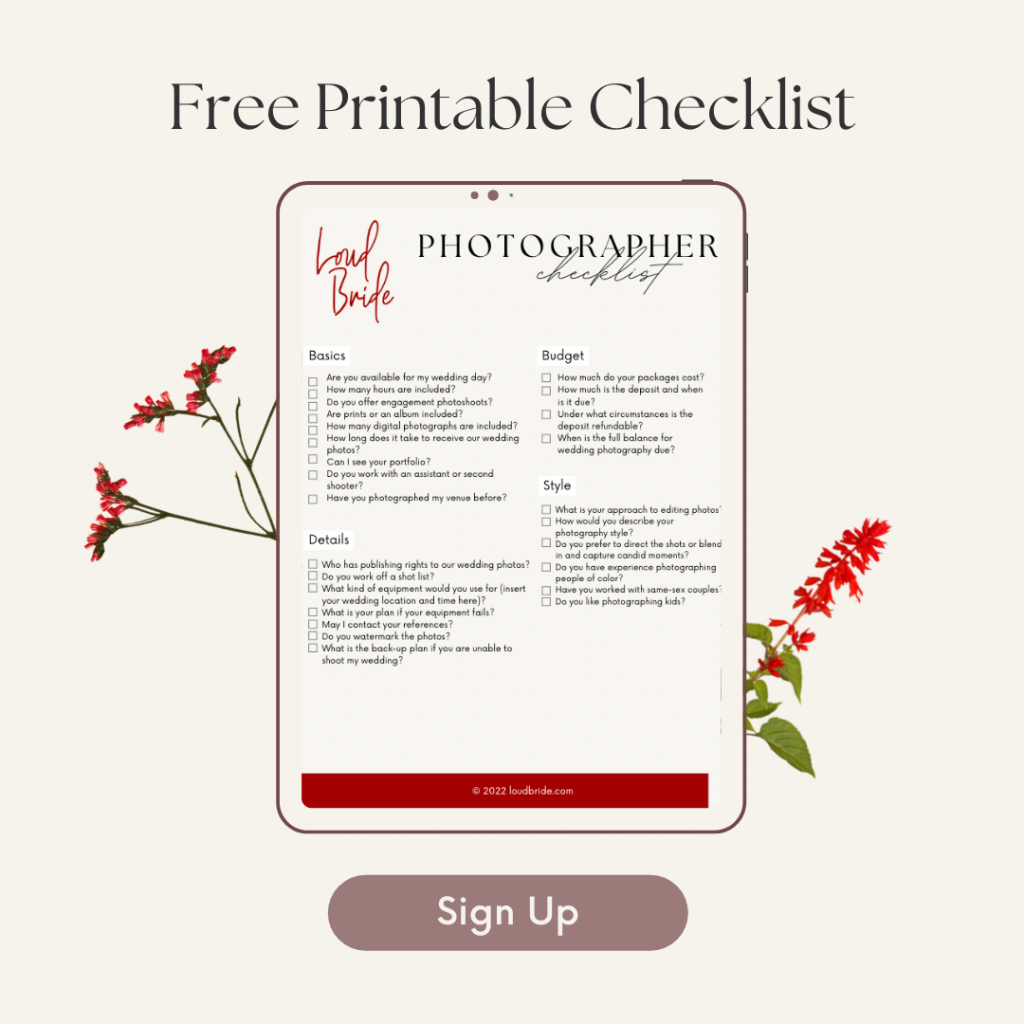Photography is one of the most important aspects of your wedding day. Run through this wedding photographer checklist with all of the questions to ask before you book. You will look back on your wedding for years to come and probably frame a wedding portrait in your home. Make sure those memories are beautifully captured by choosing the right photographer.
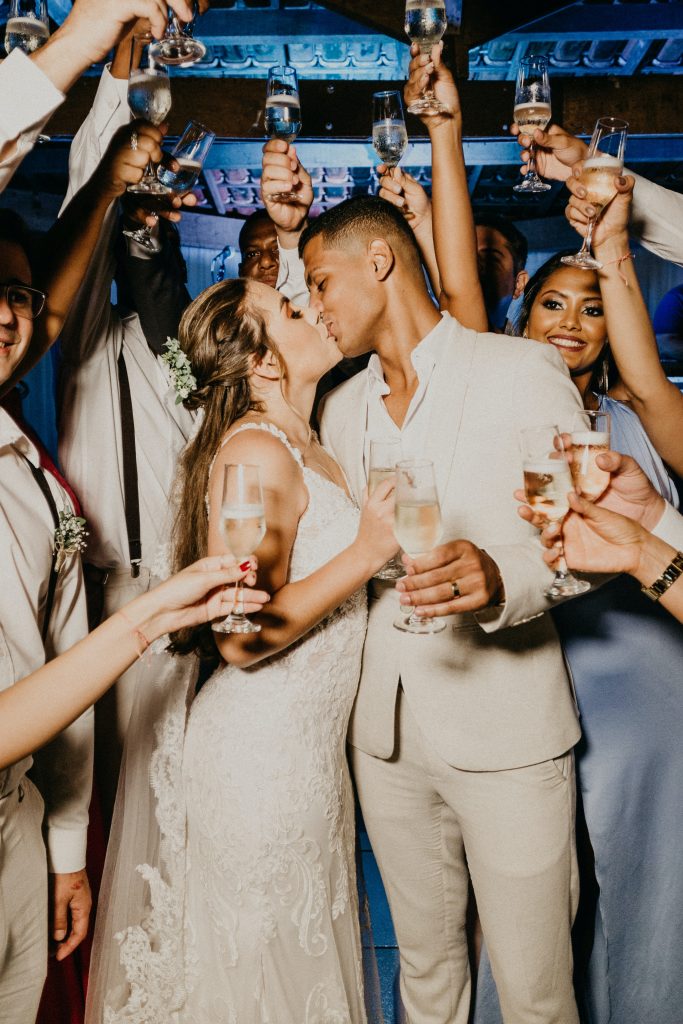
What do you ask a wedding photographer?
Before you hire a wedding photographer, you should ask them some basic questions to ensure they are compatible with your wedding.
Ask the photographer about what is included in the contract, their typical photography style, and their level of experience with your specific wedding venue. By asking these simple questions, you will get an insight into if they are the right photographer for your wedding.
For a more detailed check list to run through to help you make the best pick for your big day, keep reading.
Wedding photographer checklist
Before you sign the contract with your photographer, you and your fiance should meet with them in person to ask some questions. Notice how they interact with you. Are they punctual, friendly, and engaging? Or do they seem distant and distracted? Make sure you select a photographer who you feel comfortable working with.
This person will be watching you kiss after all. And interacting with all of your friends and family. Once they pass the first impression test, you can bring out your checklist and ask some questions to make sure they share your wedding vision.
1. Are you available for my wedding day?
Your very first question should be if they are available on your specific wedding date. The venue is usually the first thing you book, and that will determine your wedding day. You can read more about why you book the venue first here. If the photographer you want isn’t available on that day, you can ask them for recommendations on other photographers in the area.
2. How much do your photography packages cost?
It’s important to know how much their basic photography packages cost. Since budget is often non-negotiable for both the couple and the photographer, you want to make sure you are on the same page. If the photographer is out of your budget, don’t try to low ball them.
If you’re on a tight budget and can’t afford a photographer, check out some tips for what to do if you don’t have a wedding photographer.
3. How many hours are included in your photography package?
Some photographers offer elopement packages if you need just a couple of hours for a private courthouse wedding. Traditional weddings will require at least 6 hours of photography. If you want someone to capture the getting ready shots, ceremony, reception, and send off, you will need at least 8 hours of coverage. If there is a large gap between the ceremony and reception, you will need to add even more hours.
For my sister’s wedding, she was able to ask her photographer to add on more hours to her package instead of the included engagement session. Since her wedding was out of town she wouldn’t be able to take advantage of the engagement session offer. And the photographer was happy to do it. So it’s worth asking if there’s things you can swap in and out of the package if a service you want isn’t included.
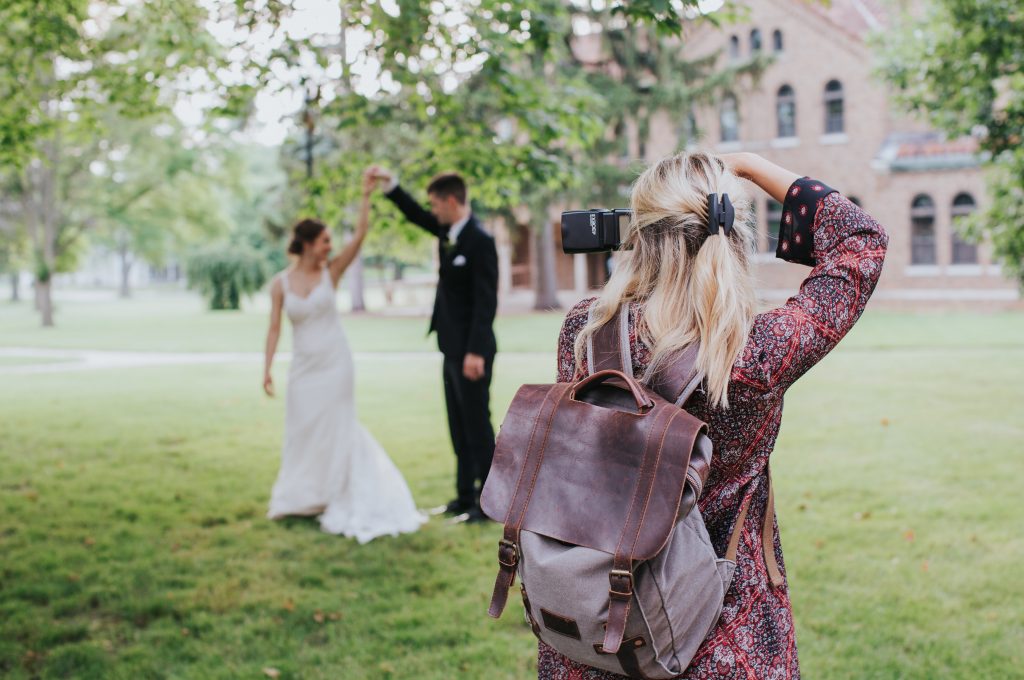
4. Do you offer engagement photoshoots?
You can often save money by bundling your wedding and engagement photoshoots. The engagement photoshoot will give you an opportunity to get comfortable with your photographer before the wedding day. You’ll also have great shots to share on your wedding website or at the reception.
Many photographers offer a free engagement shoot session for this reason. Take a look at this article all about tips for preparing for your engagement session from a professional photographer.
5. Are prints or an album included in the photography package?
Photographers are less likely to include prints in their packages nowadays, but they often offer them as add-ons. If you are trying to save costs, consider printing the photos yourself from shutterfly.com, snapfish.com, or your local pharmacy or office supply store. These websites are also great for making canvases or albums.
6. How many digital photographs are included?
Just because you are paying for 8 hours of photography, does not necessarily mean that all 8 hours of photos are included. Photographers will select and edit the best shots they’ve captured. Expect most photographers to include about 50-100 photos per hour of contracted work, but this will vary from person to person.
7. How long does it take to receive our wedding photos?
The time between your wedding and receiving your photos can be longer than expected. On average it takes about 4-6 weeks for the photographer to cull and edit the photos and return the digital images to the couple. It might take less time for a small or off season wedding. It could also take two months or longer for large weddings or peak wedding season shoots. Include the timeline in your contract so you are not waiting until your anniversary for pics.
There is a lot of time and effort required to edit your photos so don’t bug your photographer the day after your wedding to see some pictures. Sometimes photographers will release a sneak peek to you a few days after the wedding just to put your mind at ease. So feel free to ask if they offer any sneak peeks.
8. What is your approach to editing photos?
It’s important to know if the photographer uses a light touch or a heavy hand with the photoshop. Editing is expected, to fix minor framing or lighting issues. Touch-ups can also be used to remove imperfections like stray hairs or blemishes. Just make sure your photographer isn’t going to face-tune grandma into a Kardashian. Unless you’re into that sort of thing. 😉
9. Who has publishing rights to our wedding photos?
Usually the photographer includes a clause in their contract that they retain publishing rights for their work. That means that they can post your wedding photos in their social media, marketing material, or in art exhibits or books. It also would mean that you are limited in how you can use your photos if you intend to use them for business purposes (like to promote your wedding blog). If publishing rights are important to you, negotiate them before signing the contract.
Another issue for you might be privacy. If you’re having anyone at your wedding who values privacy or you want to keep minors out of the spotlight, you can negotiate with most photographers to agree not to use your photos for marketing purposes. Some photographers will charge an additional fee for this.
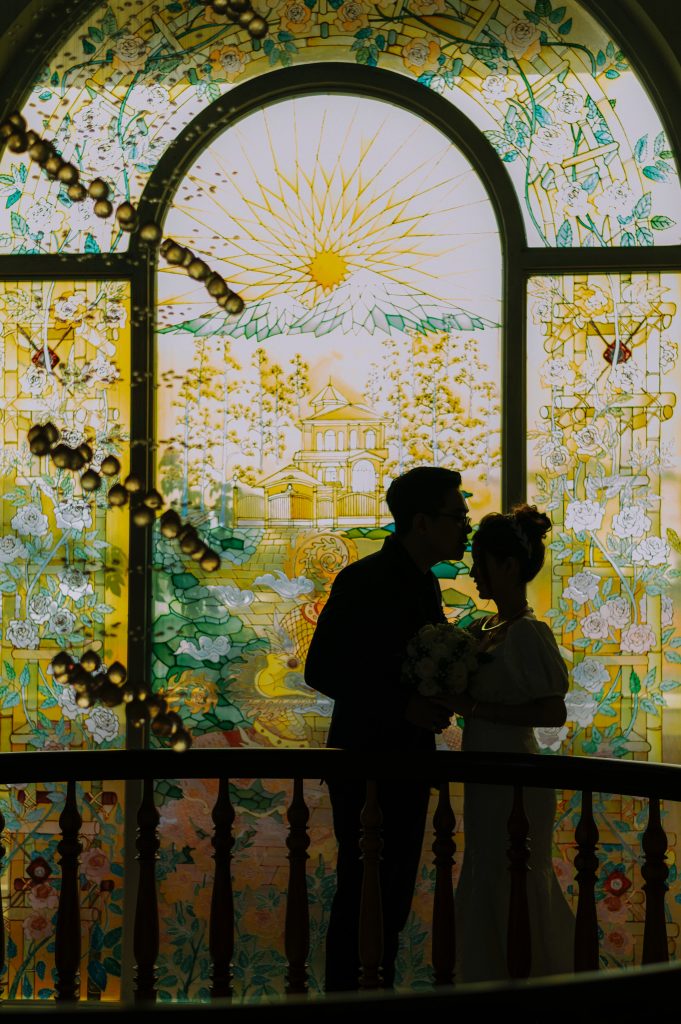
10. How much is the deposit and when is it due?
The price of the deposit varies significantly from city to city, and even among photographers in the same location. Expect to pay 20-50% of the full wedding package in order to book your photographer. It might sound like a lot, but consider that the photographer needs to turn down other work in order to hold your day. And photographers books months in advance. So if you cancel at the last minute, it’s hard for them to replace your date with other paying work.
11. Under what circumstances is the deposit refundable?
Photography budgets are often non-refundable, unfortunately. Remember most photographers are small business owners and have bills to pay. If you are not sure of the wedding day, hold off on booking your photographer. There may be specific circumstances on when the deposit is refundable, so ask about this before you sign a contract.
12. When is the full balance for wedding photography due?
Find out when the full balance is due to your photographer. This date can range from 2 months before the wedding to the week of the wedding.
Not sure how much you can afford to pay a photographer?
You can check out my free budget guide if you sign up for my newsletter. It automatically calculates what you should spend where based on your budget and guest count and helps you stay on track. It’s like the fairy godmother of numbers.
13. How would you describe your photography style?
Listen for keywords that describe their artistic vision. Some examples include: classic, soft and romantic, dark and moody, photojournalism, and lifestyle. This style will be reflected in the composition of the pictures and the body language and facial expression of the subjects. Make sure their style meshes with yours.
14. Do you prefer to direct the shots or blend in and capture candid moments?
There is no right or wrong answer to this question. Classic wedding portraits tend to be posed, while photojournalism is focused on capturing unscripted moments. It’s about your personal preference. Some brides find a director-style photographer intrusive. Others will appreciate clear instructions on how to pose. Usually photographers do a mix of both to capture both posed and candid shots.
15. Can I see your portfolio?
It’s great to hear about their style, but it’s even better to see it. Look through their portfolio and notice what kind of vibe their photos give off. Bright and lively or serious and introspective? Make sure to bring some photos of the styles you like as well to talk about what you like and why.
16. Do you work off a shot list?
A shot list is a document that lays out all of the moments you want captured on your wedding day. Some photographers (and some couples!) prefer to work more spontaneously and capture candid shots. If you want to do a combination of posed photos and candid photos, just ask.
A shot list is also great if you want photos of specific relatives. You’ll want to make sure you schedule time in your day to capture all of the requested shots. A skilled photographer can help you fit it into the schedule or let you know if you need to trim down the list. Read more about creating a day of wedding timeline, here.
17. What kind of equipment would you use for (insert your wedding location and time here)?
Even if you aren’t super knowledgeable about photography equipment, you should ask what kind of gear they have. This question ensures the photographer knows about your wedding location and explains how they will tailor their equipment to get the shot. For example, they should bring different equipment for a sunny beach wedding, than for a candlelit chapel. If the photographer can’t answer this question, or says the same equipment can work regardless of lighting, RUN!
18. What is your plan if your equipment fails?
Stuff happens- batteries die and cameras break. It’s important to choose a photographer with a backup plan for when things go wrong. At a minimum, they should bring extra lenses, an external battery pack, extra memory cards, and a back up camera.
19. Do you work with an assistant or second shooter?
A second photographer might be necessary for capturing every special moment. For example, one photographer can capture the bridal party getting ready while the assistant photographs the rings and accessories. Likewise, one photographer captures the bride processing in and the second shooter gets the groom’s face when he first sees her. Expect to pay extra for a second shooter if it’s not included in the original package.
20. Have you photographed my venue before?
Ideally your photographer has worked at your venue before and can show examples in their portfolio. If they haven’t been there yet, ask if they would be willing to visit before the wedding to scope out the space. That way, they will know what equipment to bring and have a plan of where to stand.
If they haven’t photographed your location yet but you love their style it’s not a deal breaker. They can always take a look at the venue’s website to see common places within the venue to get great shots or visit the venue in advance.
21. Do you have experience photographing people of color?
If anyone in your family or friend group is non-white, you want to make sure your photographer is experienced working with people of color. Historically, the photography industry has often overlooked BIPOC clients. There are different lighting and editing techniques to make sure darker skin doesn’t get washed out on the page.
22. Have you worked with same-sex couples?
If you and your partner are queer, make sure you find a photographer who honors and celebrates your love. I wouldn’t want anyone at my wedding who made me or my guests feel othered. If asking about their experience with the LGBTQ community makes a potential photographer uncomfortable, don’t give them your money.
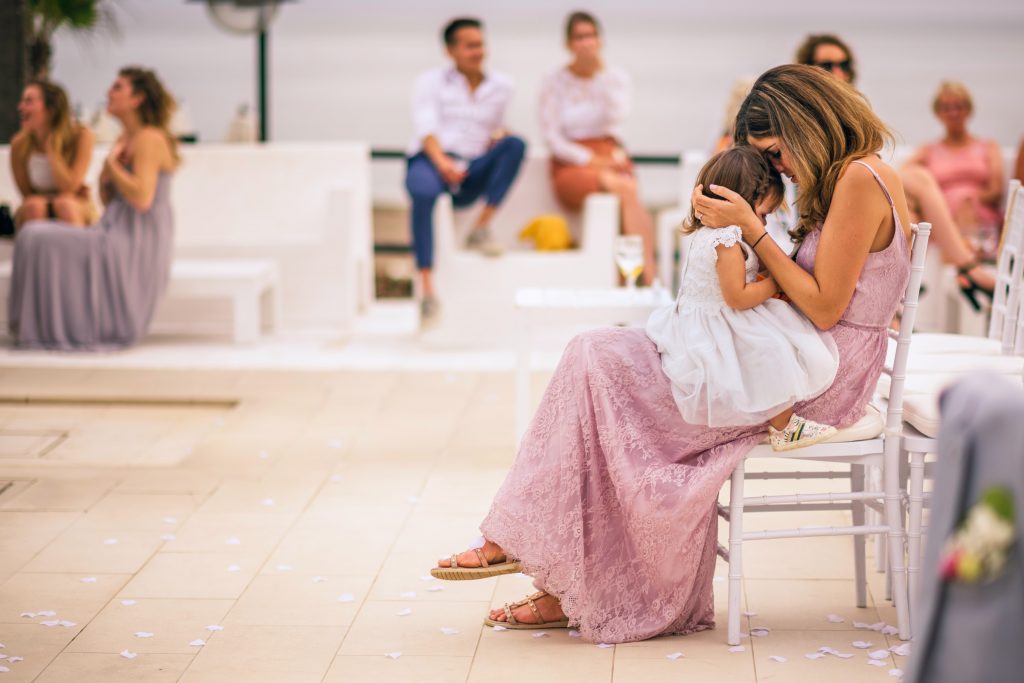
23. Do you like photographing kids?
It’s important that a photographer knows how to best capture kids if you or your partner’s kids are in the wedding. You’re going to want someone who is patient with tantrums and meltdowns. Check out this article about how to best include children in your wedding.
24. May I contact your references?
Once you’ve reviewed the contract and their portfolio, you can also ask to speak with past clients. A reputable photographer will have happy customers on file who can speak to their work. A photographer who can’t provide references is either very new to the business or a scam artist. So be wary of booking them.
25. Do you watermark the photos?
Sometimes photographers include a watermark on the digital versions of their photos and only let you purchase prints through them. You’ll want to avoid this if you can because it will add a lot of unnecessary fees at the end of the day to use the photos without watermarks.
26. What is the back-up plan if you are unable to shoot my wedding?
If the last couple years have taught us anything, it’s that you need a back up plan. Your photographer should have an arrangement with another photographer, in case they have a personal emergency or illness that prevents them from capturing your wedding.
Final Thoughts
Did you enjoy this check list? Get a free printable version of this check list by signing up for the Wedding Planning Club newsletter.

